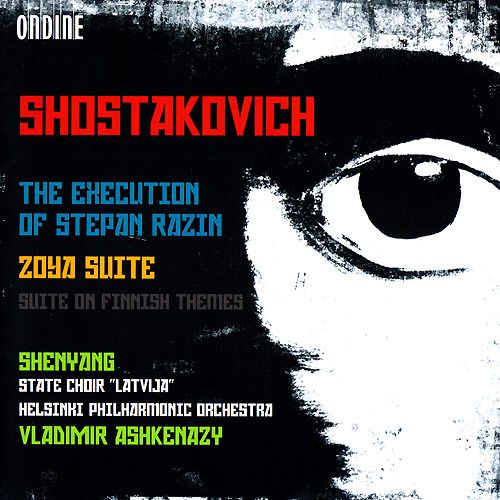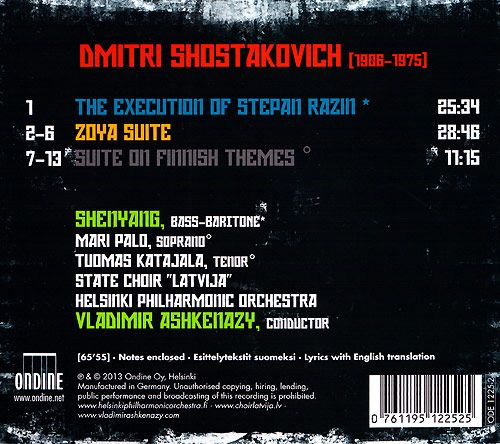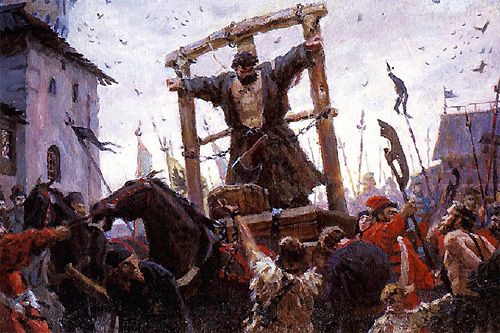wimpel69
11-26-2014, 10:39 AM
EAC-FLAC link below. This is my own rip. Complete artwork,
LOG and CUE files included. Do not share. Buy the original!
Please leave a "Like" or "Thank you" if you enjoyed this!
After composing the Thirteenth Symphony setting texts by the poet Yevgeny Yevtushenko for bass soloists,
male choir, and orchestra in 1962, Dmitri Shostakovich turned again to Yevtushenko's poetry for his symphonic poem
The Execution of Stepan Razin in 1964, also scored for bass soloist and orchestra, but this time with mixed
chorus. Taking up where the first movement of the Thirteenth left off, the symphonic poem is huge and muscular,
with a deeply heroic and yet profoundly ironic tone. Composed quickly over the summer of 1964 after the ninth
and tenth quartets, Shostakovich anticipated troubles with the political censors in the post-Khrushchev era.
However, although some critics carped at the work's perceived "naturalism," overall critical response was
positive after the December premiere.
Although Shostakovich's oeuvre is rich in underappreciated masterpieces, The Execution of Stepan Razin is
especially worthy of revival. A powerfully scored and strongly imagined work, the work is Shostakovich at the
absolute peak of his powers. Without the constraints of Stalin and the Party and with the righteous fury of the
Thirteenth Symphony all behind him, Shostakovich made Yevtushenko's poem his choral-orchestral masterpiece.
Although not as wide-ranging as the Thirteenth in its emotional or musical scope, it has a more concentrated
and intense passion matched, but not exceeded, even by the first movement of the Thirteenth.
The music for Lev Arnshtam's movie Zoya, Op. 64, was Shostakovich's third film with this director
(the first was Girl Friends from 1934 - 35 and Friends from 1938). The Zoya of the title was Zoya
Kosmodemyanskaya, a heroine of the early years of the Great Patriotic War as World War II was known in the
Soviet Union. The film was made in the closing days of the War and celebrates the heroic spirit of the Soviet
people and, of course, the genius, heroism and wisdom of Joseph Stalin. Needless to say, the film won a
Stalin prize as best film of the year.
The complete score for Zoya is currently unavailable in any recording. However, judging from the suite as
recorded by the composer's son Maxim, the music is in Shostakovich's best "war" symphony mode, with
the seventh and eighth symphonies echoing throughout the score. And, typically for Shostakovich's film
scores, well-known tunes are quoted throughout including the chorus "Be Glorified" from Glinka's A Life for
the Czar and, of course, the Internationale. Unusually, however, the score also has a transcription of
the E flat minor Prelude from Shostakovich's Op. 34 set of Twenty-four Preludes. It is easily the best
part of the music and far surpasses Leopold Stokowski's orchestral transcription of the prelude.

Music Composed by
Dmitri Shostakovich
Played by the
Helsinki Philharmonic Orchestra
With
Shenyang (bass-baritone)
And the
State Choir "Latvia"
Conducted by
Vladimir Ashkenazy

"The continuing growth in interest in the music of Dmitry Shostakovich has led to major recordings
even of works that haven't been played much since they received their premieres in the composer's
immediate circle. The first two works on this Finnish release might fit that category; the final Suite
on Finnish Themes is still rarer, having only recently been rediscovered. The two larger works might
be paired with symphonies that were contemporary with them and could easily make companion
pieces for those symphonies in concert. The Execution of Stepan Razin for bass, chorus, and
orchestra, Op. 119, was composed in 1964. Its symphonic cousin is the Symphony No. 13 ("Babi Yar"),
composed on texts by Yevgeny Yevtushenko. The text of this cantata was from a later set of poems
by Yevtushenko, who by that time, in the more restrictive atmosphere that followed the overthrow
of Nikita Khrushchev, had fallen into disfavor. Shostakovich, however, was more or less untouchable,
and furthermore there is nothing in the score to offend socialist-realist orthodoxy: the work is a
blood-and-guts action cantata, complete with rolling severed head � la Symphonie fantastique. It
would make any audience sit up and take notice on a program of Russian music. The Zoya Suite,
from 1944, consists of selections from a partly lost film score about the Soviet war effort against
Nazi Germany. The relevant symphony here is No. 7, but the work is even more conservative in
style, as are most of Shostakovich's film scores. The music has a genuine sense of simple tragedy,
however, and it's unlike anything else in the composer's oeuvre. The Suite on Finnish Themes is
simpler still; it is essentially a group of folk song settings. In no way is this collection a cornerstone
Shostakovich release, yet there isn't a dull moment on it, and Vladimir Ashkenazy, leading the
Helsinki Philharmonic Orchestra, a Latvian choir, and a stellar trio of soloists including the
sensational single-named Chinese bass-baritone Shenyang, is clearly having fun with the project.
Recommended for Shostakovich lovers."
All Music

Sergei Kirillov, An �tude for �The Execution of Stepan Razin�. 1986
Download Link - https://mega.co.nz/#!uJwRUbyS!aiyOB34xAwbzHb2OAIuuPGs8fRAr2Dfsug4aOgV V0WU
Source: Decca CD, 1993 (my rip!)
Format: FLAC(RAR), DDD Stereo, Level: -5
File Size: 310 MB (incl. artwork, booklet, log & cue)
Enjoy! Don't share! Buy the origina! Please leave a "Like" or "Thank you" if you enjoyed this! :)
LOG and CUE files included. Do not share. Buy the original!
Please leave a "Like" or "Thank you" if you enjoyed this!
After composing the Thirteenth Symphony setting texts by the poet Yevgeny Yevtushenko for bass soloists,
male choir, and orchestra in 1962, Dmitri Shostakovich turned again to Yevtushenko's poetry for his symphonic poem
The Execution of Stepan Razin in 1964, also scored for bass soloist and orchestra, but this time with mixed
chorus. Taking up where the first movement of the Thirteenth left off, the symphonic poem is huge and muscular,
with a deeply heroic and yet profoundly ironic tone. Composed quickly over the summer of 1964 after the ninth
and tenth quartets, Shostakovich anticipated troubles with the political censors in the post-Khrushchev era.
However, although some critics carped at the work's perceived "naturalism," overall critical response was
positive after the December premiere.
Although Shostakovich's oeuvre is rich in underappreciated masterpieces, The Execution of Stepan Razin is
especially worthy of revival. A powerfully scored and strongly imagined work, the work is Shostakovich at the
absolute peak of his powers. Without the constraints of Stalin and the Party and with the righteous fury of the
Thirteenth Symphony all behind him, Shostakovich made Yevtushenko's poem his choral-orchestral masterpiece.
Although not as wide-ranging as the Thirteenth in its emotional or musical scope, it has a more concentrated
and intense passion matched, but not exceeded, even by the first movement of the Thirteenth.
The music for Lev Arnshtam's movie Zoya, Op. 64, was Shostakovich's third film with this director
(the first was Girl Friends from 1934 - 35 and Friends from 1938). The Zoya of the title was Zoya
Kosmodemyanskaya, a heroine of the early years of the Great Patriotic War as World War II was known in the
Soviet Union. The film was made in the closing days of the War and celebrates the heroic spirit of the Soviet
people and, of course, the genius, heroism and wisdom of Joseph Stalin. Needless to say, the film won a
Stalin prize as best film of the year.
The complete score for Zoya is currently unavailable in any recording. However, judging from the suite as
recorded by the composer's son Maxim, the music is in Shostakovich's best "war" symphony mode, with
the seventh and eighth symphonies echoing throughout the score. And, typically for Shostakovich's film
scores, well-known tunes are quoted throughout including the chorus "Be Glorified" from Glinka's A Life for
the Czar and, of course, the Internationale. Unusually, however, the score also has a transcription of
the E flat minor Prelude from Shostakovich's Op. 34 set of Twenty-four Preludes. It is easily the best
part of the music and far surpasses Leopold Stokowski's orchestral transcription of the prelude.

Music Composed by
Dmitri Shostakovich
Played by the
Helsinki Philharmonic Orchestra
With
Shenyang (bass-baritone)
And the
State Choir "Latvia"
Conducted by
Vladimir Ashkenazy

"The continuing growth in interest in the music of Dmitry Shostakovich has led to major recordings
even of works that haven't been played much since they received their premieres in the composer's
immediate circle. The first two works on this Finnish release might fit that category; the final Suite
on Finnish Themes is still rarer, having only recently been rediscovered. The two larger works might
be paired with symphonies that were contemporary with them and could easily make companion
pieces for those symphonies in concert. The Execution of Stepan Razin for bass, chorus, and
orchestra, Op. 119, was composed in 1964. Its symphonic cousin is the Symphony No. 13 ("Babi Yar"),
composed on texts by Yevgeny Yevtushenko. The text of this cantata was from a later set of poems
by Yevtushenko, who by that time, in the more restrictive atmosphere that followed the overthrow
of Nikita Khrushchev, had fallen into disfavor. Shostakovich, however, was more or less untouchable,
and furthermore there is nothing in the score to offend socialist-realist orthodoxy: the work is a
blood-and-guts action cantata, complete with rolling severed head � la Symphonie fantastique. It
would make any audience sit up and take notice on a program of Russian music. The Zoya Suite,
from 1944, consists of selections from a partly lost film score about the Soviet war effort against
Nazi Germany. The relevant symphony here is No. 7, but the work is even more conservative in
style, as are most of Shostakovich's film scores. The music has a genuine sense of simple tragedy,
however, and it's unlike anything else in the composer's oeuvre. The Suite on Finnish Themes is
simpler still; it is essentially a group of folk song settings. In no way is this collection a cornerstone
Shostakovich release, yet there isn't a dull moment on it, and Vladimir Ashkenazy, leading the
Helsinki Philharmonic Orchestra, a Latvian choir, and a stellar trio of soloists including the
sensational single-named Chinese bass-baritone Shenyang, is clearly having fun with the project.
Recommended for Shostakovich lovers."
All Music

Sergei Kirillov, An �tude for �The Execution of Stepan Razin�. 1986
Download Link - https://mega.co.nz/#!uJwRUbyS!aiyOB34xAwbzHb2OAIuuPGs8fRAr2Dfsug4aOgV V0WU
Source: Decca CD, 1993 (my rip!)
Format: FLAC(RAR), DDD Stereo, Level: -5
File Size: 310 MB (incl. artwork, booklet, log & cue)
Enjoy! Don't share! Buy the origina! Please leave a "Like" or "Thank you" if you enjoyed this! :)